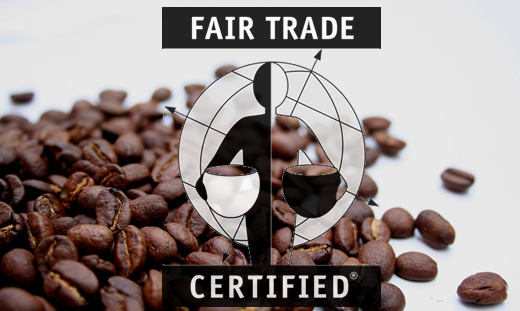 In January Fazenda Nossa Senhora de Fatima (FNSF), a 500-acre, 100% organic, family-owned coffee farm in Brazil, became the world’s first Fair Trade Certified™ coffee estate. Within 3 months of certification, the farm’s 110 workers (40% of whom are women) earned $7,250 in community development premiums, which they elected to invest in critical healthcare programs. Through FNSF’s participation in Fair Trade USA’s Fair Trade for All initiative, 30 workers have already received eye exams, 27 received glasses, and 11 received dental care.
In January Fazenda Nossa Senhora de Fatima (FNSF), a 500-acre, 100% organic, family-owned coffee farm in Brazil, became the world’s first Fair Trade Certified™ coffee estate. Within 3 months of certification, the farm’s 110 workers (40% of whom are women) earned $7,250 in community development premiums, which they elected to invest in critical healthcare programs. Through FNSF’s participation in Fair Trade USA’s Fair Trade for All initiative, 30 workers have already received eye exams, 27 received glasses, and 11 received dental care.
Pictured at right is farm worker Maria Filha de Jesus, age 58, holding her very first pair of eye glasses.
“I have never owned glasses before. For years I knew I needed glasses but I could not afford them. It was becoming harder and harder to do my job because I could not see well. Earlier today I could not clear the weeds properly to prepare the field for the harvest and for the workers to pick the coffee easier. Now that I have these eyeglasses I will be able to continue working and can see better at home.” – Maria Filha de Jesus, FNSF farm worker
Empowerment in Action
To earn Fair Trade certification, FNSF met Fair Trade USA’s rigorous standards, which ensure that all workers are paid fair prices and wages, work in safe conditions, protect the environment, and earn community development funds to empower and improve their communities.
The standards also require that the workers form a Fair Trade Committee, a group responsible for listening to the needs of the workers, choosing how to invest their Fair Trade community development premiums, and implementing each project. After the sale of their first two containers of Fair Trade Certified coffee, the Committee members voted to invest the premiums in eye and dental care for the workers.
As a result of these tangible, life-changing benefits, the workers of FNSF now see Fair Trade as so much more than a fair price– they see it as a symbol of hope, pride and opportunity for themselves and their families.
“This farm has several certifications already, but this one you mention, Fair Trade, is the first one that focuses on us, the workers.” – Maria da Conceição F. Lima, RNSF Farm Worker
Ricardo Aguiar Resende (pictured right), a third-generation coffee farmer, and his wife Gisele direct the production, commercialization and social projects at the farm. The couple sees Fair Trade certification as a way to thank and empower their 110 workers and the local communities. In an open letter to Fair Trade USA, the workers of FNSF express deep gratitude for the opportunity to be included in Fair Trade, and their sincere belief in a brighter future.
Luir Fontes, a farm worker representative, commented on the impact Fair Trade has already made on the farm:
“Workers now see the opportunity to have a direct influence on the success of the farm. The transparency, increased funds, and ownership of work have changed what was previously seen as a 200-hectare farm with 100 workers into 100 farmers with their own 2-hectare projects.” – Luir Fontes, FNSF Worker Representative
Blending the Benefits
We truly believe that our efforts to deliver more impact to more people will benefit all farmers and workers in the system. To that end, this first pilot in Brazil is already generating impact for both farm workers and cooperative farmers.
In order to achieve their unique flavor profile, Allegro Coffee Company®, like many roasters, has created blends for years that contain beans from both Fair Trade Certified cooperatives and non-Fair Trade farms. Because of the rigorous Fair Trade standards, which dictate that 100% of the beans in every bag of coffee must be Fair Trade Certified in order to use the certification mark, Allegro has not previously been able to label one of their top-selling espresso blends (Espresso Bel Canto) as Fair Trade Certified. Although Allegro still supports responsible wages and ethical treatment for farm workers, they weren’t paying Fair Trade premiums to the co-op farmers selling into this blend. Now that Fazenda Nossa Senhora de Fatima has earned certification, Allegro can use the Fair Trade Certified label and premiums are being paid to both the farm workers and the cooperative farmers. It’s a win for all.
“With Fair Trade, everyone feels better off and the community feels very positive about the future. The benefits are real. This is real.” – Ricardo Aguiar Resende, FNSF Owner
 Looking Ahead
Looking Ahead
If you enjoyed this story, please stay tuned as we embark on our new Innovation Update Series. Through these posts, we will share both the successes and challenges involved in launching each coffee pilot, our cooperative-strengthening program Co-op Link, and our progress on Fair Trade for All as a whole. It’s unique opportunity for people to learn about the farmers and workers participating in these programs, what Fair Trade means to them, and how we can work together to build a more inclusive, collaborative approach that supports everyone in the global coffee supply chain willing to commit to a journey of sustainability, responsibility, empowerment and impact.


Leave a Reply
You must be logged in to post a comment.